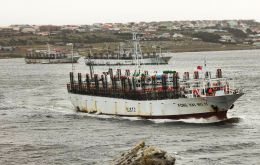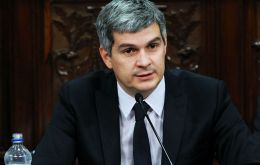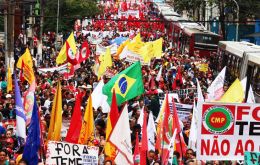MercoPress. South Atlantic News Agency
Economy
-
Tuesday, November 15th 2016 - 09:40 UTC
ANCAP's Carboclor sinks deeper, goes after sale or merger

Losses increase from US $ 9 million by mid year to US $ 14 million in September due to contraction of domestic demand, the fall in international prices and the percentage of ethanol cut in gasolines.Carboclor, ANCAP's subsidiary in Argentina, shows no sign of recovery in its most recent balancesheet as production fell below “normal levels” caused by financial shortcomings which in turn led to a decrease in the inflow of raw materials to the refinery in Campana in the province of Buenos Aires. Shutting down the plant for 25 days is being considered as a partial solution.
-
Tuesday, November 15th 2016 - 09:02 UTC
Trump promises Argentina, a great country, “the closest relation in history”

“Argentina is a great country” and Argentina and the US will have “the closest relation in history”, according to the official version from the administration of president Mauricio Macri who on Monday was on the phone with president elect Donald Trump to congratulate him on his presidential victory.
-
Monday, November 14th 2016 - 08:36 UTC
Chile connects Latin America's largest solar plant to the national grid

Spanish clean energy company Acciona Energía has connected the 246MW El Romero solar plant in Atacama desert, Chile to the county’s Interconnected Central System (SIC), becoming Latin America's largest. The US$343m El Romero Solar plant features 776,000 polycrystalline silicon photovoltaic modules, spread across 280ha area in the municipality of Vallenar, 645km north of the Santiago.
-
Monday, November 14th 2016 - 07:54 UTC
Petrobras cleans balance sheet and posts unexpected third quarter loss

Brazilian state-controlled oil company Petrobras posted an unexpected third-quarter loss after drastically reducing the value of oil fields and other assets amid a severe downsizing and weak oil prices. Petrobras lost a net 16.458 billion reais (US$4.9 billion) last quarter, five times more than a year earlier. Despite that, operational and cash flow trends improved and, without an impairment, profit could have totaled 600 million Reais, Chief Financial Officer Ivan Monteiro said.
-
Monday, November 14th 2016 - 07:45 UTC
Falklands' government first quarter surplus jumps to £6.407 million

The Falkland Islands government numbers are looking brighter than forecasted: for the first three months of the financial year (July –September), the government is showing an actual surplus of £6.407 million, compared to a estimated surplus of £2.211 million.
-
Monday, November 14th 2016 - 07:31 UTC
Argentina looks forward to a good relation with president Trump, who is no longer “candidate Trump”

Argentina has an excellent relation with the Obama administration and this will be the case with a government led by Trump, pointed out Argentina's cabinet secretary Marcos Peña adding that the first signals from the elected president are positive since he is moderating his electoral campaign speech.
-
Saturday, November 12th 2016 - 21:31 UTC
Demostrators rally in Sao Paulo against Temer's adjustment proposals

Protesters Friday blocked some of Sao Paulo's main avenues to object to the the bill to freeze public spending for 20 years. Others set roadblocks with tires at the Vía Dutra, which links Sao Paulo with Rio de Janeiro, and Via Anchieta, the main road between the city and the coast.
-
Saturday, November 12th 2016 - 21:24 UTC
Trump wave keeps Merval on the fall for a total 9.25% drop in a week

The index of the leading shares of the Buenos Aires stock market returned to adjust results in 3.51% and accumulated thus four rounds of losses for a total drop of 9,25% sice Monday. The Merval started the week with 17,257.56 points and dropped Friday to 15,659.74 points, with significant decreases except for Tenaris, which managed to stay away from the trend of US-based businesses thanks to a positive balancesheet produced last week.
-
Saturday, November 12th 2016 - 21:01 UTC
McDonald's burgers are not welcome in Florence's Piazza del Duomo

McDonald's is suing the city of Florence for €18m after it was blocked from opening a restaurant on one of the Italian city's most historic plazas. The fast-food giant had its plans for an outlet on the Piazza del Duomo rejected by Florence's mayor in June and the decision was upheld in July by a technical panel in charge of preserving the city's ancient heart.
-
Saturday, November 12th 2016 - 20:48 UTC
Argentine bishops call for a “Christmas in Peace” and public and private responsibility

The chair of the Argentine Episcopal Conference (CEA) Monsignor Jose Maria Arancedo renewed his call to the leadership of the country, political, social, unions and business, to leave aside special interests and act responsibly for the good of the country, at “a very difficult moment” so that “we can all enjoy Christmas in Peace”
